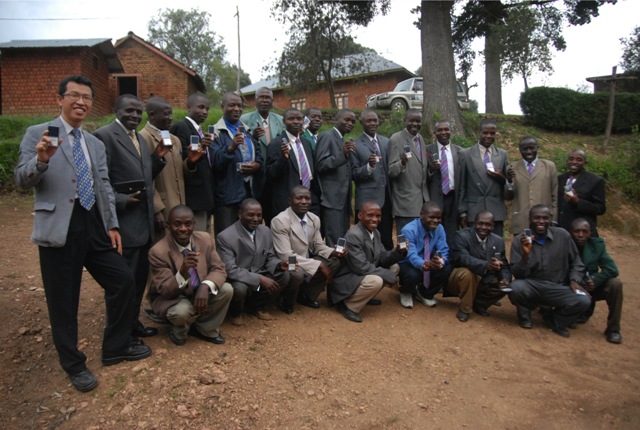Long civil war. Widespread corruption. Political confusion and ongoing skirmishes. Ranking on the index of failed states: number 2. Ranking on the global hunger index: number 3. Placement on the world governance index: 178 out of 179. Few places in the world are as plagued with problems as the Democratic Republic of the Congo (DRC).
In the face of such turmoil, where do you begin trying to make a difference? And can your efforts possibly make any difference at all?
There have been few times when I have been as proud of our world Seventh-day Adventist Church as when I began reporting on the following story. It’s easy to be impressed by stories of an individual person’s passion for personal outreach, but I venture to say that it’s less common to be awestruck by the activities of a group or organization. However, that’s what I experienced when several members from the Washington-Spencerville Korean SDA Church, located just a few miles down the road from our office, approached us at Adventist World Radio with an idea for a joint project in the DRC.
A little context would be helpful in understanding how we got to that point. The chain of events came about through a network that stretches halfway around the world, from regional church headquarters in Goyang City, Korea, through the local church in Maryland, USA, to Rafiki Mission in Butembo City, DRC.
The Northern Asia-Pacific Division developed a program called the Pioneer Mission Movement to plant and nurture churches in their territory. In 2009, they began sending missionaries to other divisions, and the DRC was the first location they chose. They felt the strongest approach would be to link individual Korean church congregations as sister churches directly with the North Kivu Field in the DRC. The Washington-Spencerville church was the first to join, and today there are 50 Korean churches involved.

.jpeg)
Surprise: the purpose is not financial support. Instead, church leaders want to motivate members to spread the gospel far beyond their own backyards. So every sister church is required to hold public evangelistic meetings at least twice a year and report their mission activities every month. Let me tell you, these people know how to organize, and their processes and results are meticulously documented.
The Korean churches have taken up an array of projects, partnering with various church organizations along the way, and one project has naturally led to another. Amazingly, all of the following projects have been rolled out under the direction of a single missionary couple: Pastor Hyo Su Jung and his wife, Yun Ju Kim.
* Angels and Children Orphanage – With support from ADRA Korea and a donor fromSouth America, an orphanage has been established for children who have been handicapped as a result of malnutrition. Assisted by personal teachers and scholarships, all of the children managed to pass their school exams this year.
* Bethlehem Bakery Project – A for-profit factory is being set up – in the face of sizable challenges – to support the orphanage and other children.
* Scholarships – Believing that education is important to young people’s futures, scholarships are being funded for students at every level, from primary school through theology studies at university. At one Adventist academy in Korea, students held a rummage sale to raise funds for a cement floor at a primary school in the DRC. Another initiative is a sewing school created to teach technical skills.
* Technical Secondary School – A dream for the future is to build a technical school to train young missionaries “who have efficiency and spirituality.” Since there is no good school in the area, church members hope that business people and other well-to-do families in the area will also send their children to the school, where they will come in contact with Adventist teachings. Pastor Jung says, “If we achieve this goal, the future of our church will be quite different.”
Without question, sharing the gospel is a top priority. The North Kivu Field has 429 churches and groups but only 45 pastors who are working in the field, sothe Korean sister churches are training lay missionaries, providing amplifier systems for public evangelism, sending mission teams for events, supplying Bibles, and arranging youth mission trips. The sister churches are now assigned to support specific lay missionaries, which will further strengthen their outreach.
This is where AWR came into the picture. The Washington-Spencerville church had heard about special audio players, called MegaVoice Ambassadors, that AWR has been distributing in different parts of the world. The small players are powered by solar panels and come pre-loaded with hours and hours of audio recordings in a selected language. The church thought they would be a perfect tool to provide to the new lay missionaries, so AWR partnered with the church to provide 300 Ambassadors. The players have just arrived in the DRC, where they will be used by the missionaries in small groups and Bible study meetings. We can’t wait to receive the first reports from these partners in Christ, who are laboring in such a remote part of the world.
At AWR, we love to share stories of single individuals who hear one of our broadcasts and discover God’s love all on their own. This scenario is at the other end of the spectrum: it demonstrates how AWR also works hand-in-hand with other parts of the church to enhance their ministry and together lead people to Jesus through an entirely different chain of events.
Can our efforts make a difference in a tumultuous place like the DRC? These dedicated Korean Adventists certainly believe so, and – through their efforts – confusion, hunger, and failure are being replaced with caring, community, skills, and newfound hope. We are proud to contribute in a small way to their vision.
by Shelley Nolan Freesland, Communication Director, Adventist World Radio
